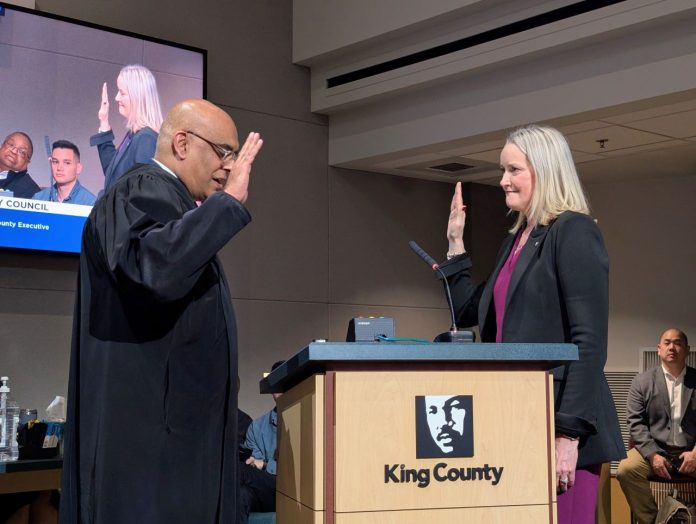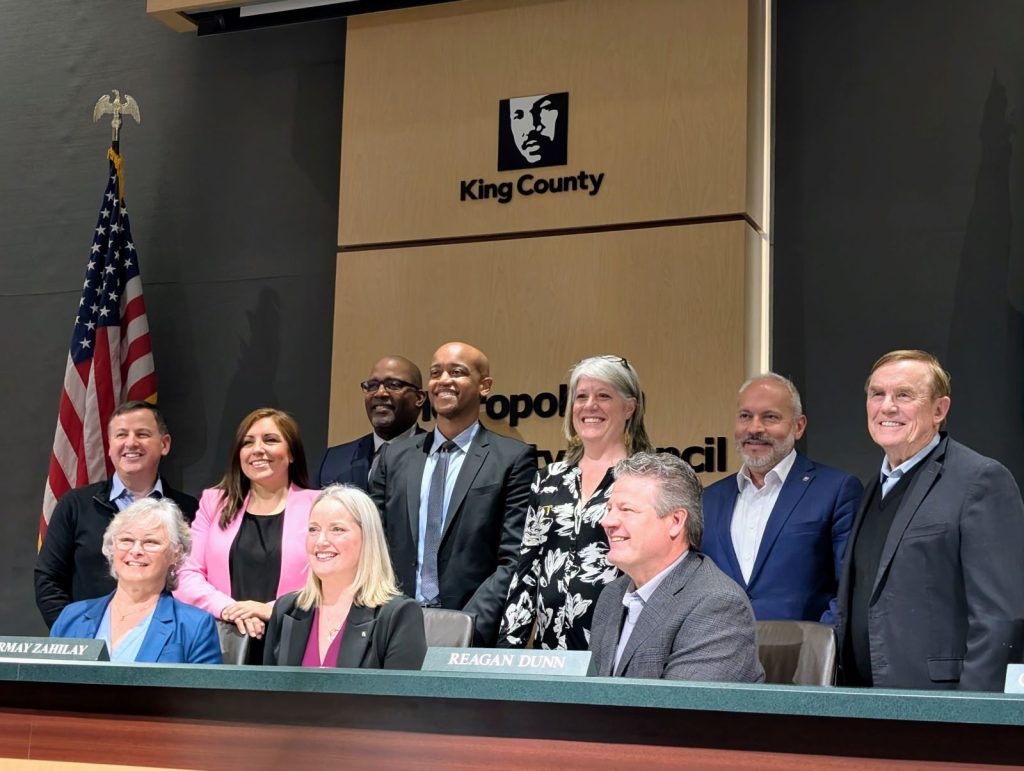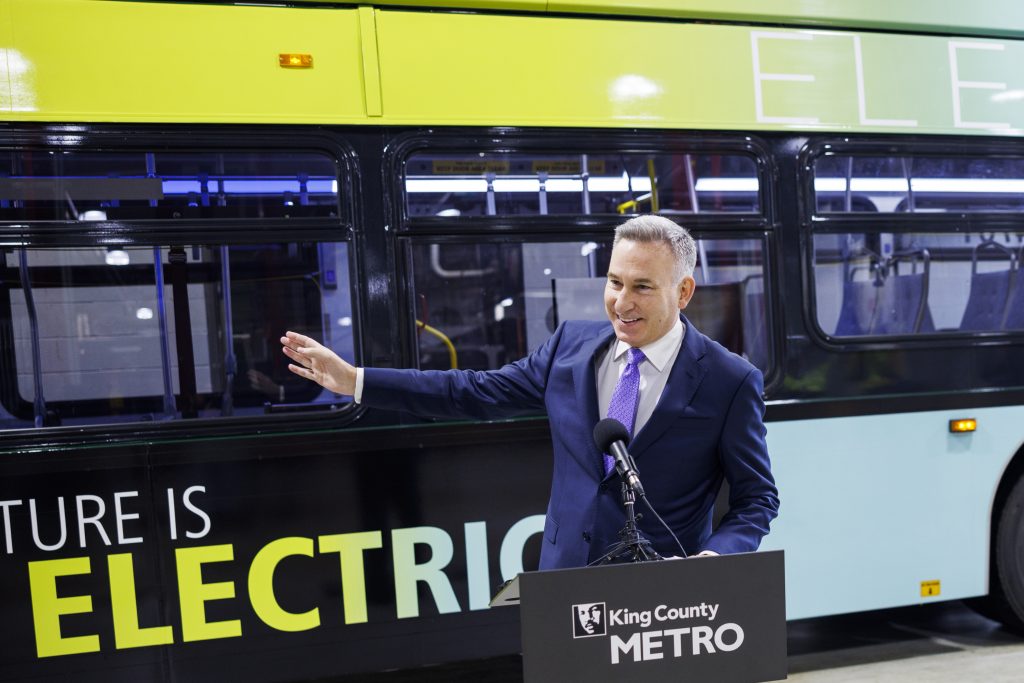
On Tuesday, the King County Council appointed Deputy County Executive Shannon Braddock as acting County Executive to fill the vacancy created by Dow Constantine accepting the job as CEO of Sound Transit. Most councilmembers shared praise and confidence in Braddock, but the council’s initial unanimous vote grants only a temporary posting as acting Executive.
County Councilmember Claudia Balducci pushed the council to take the additional step of appointing Braddock through November. On more permanent footing, the new county executive wouldn’t need to worry about being replaced by a simple majority vote to appoint somebody else, putting her on more equal footing with her predecessors.
“I want to suggest that we come back here next week and act to appoint her until November, so that we get the stability and the value of the complete and total confidence that we have in Shannon through November, as opposed to doing what was done back when Ron Sims was appointed, and going through a process that took time, that was destabilizing, that was very challenging,” Balducci said.
Vice Chair Sarah Perry agreed that appointing Braddock would have a calming influence as the County grapples with huge budgetary pressures and increasing federal turmoil. With a population of 2.3 million, King County is one of the most populous counties in the nation.
“We have show horses and workhorses, and I know you to be a workhorse and in the calm in the storm, and that’s what we need to be calm in the storm,” Perry said. “I am proud to be in a position today to support your appointment as acting Executive. Having worked closely with you over the years, I can confidently say that you are the best and most qualified person to serve as acting Executive during this critical time of transition.”
That calming influence would be more pronounced, Balducci argued, if the council acted quickly to appoint Braddock through November, rather than leaving the possibility of a different appointment looming over the acting executive’s head.
The nine members of the King County Council went into executive session to discuss Balducci’s proposal. The outcome of the session wasn’t clear, with Balducci expressing intent to return with to appoint Braddock through November, but no firm date set for that action nor clear consensus behind that proposal. The council is on recess next week, but Balducci said she’s in favor of acting before the end of the month.
It’s possible that some councilmembers prefer to keep open the option of appointing somebody else. One member who was relatively quiet as others praised Braddock was Council Chair Zahilay, who also left the motion to install her as acting Executive to the vice chairs rather than sponsoring it himself.

Both Balducci and Council Chair Girmay Zahilay are running for election to the open County Executive seat. Balducci announced her campaign in November the same day as Constantine revealed his plans to step aside. Zahilay launched his campaign shortly thereafter, as did King County Assessor John Wilson. Meanwhile, Braddock pledged that she would not be running for election in hopes of extending her term beyond the interim appointment.
The winner of this year’s election will take over immediately upon the certification of results in late November.
The first female county executive in King County history
Councilmember Teresa Mosqueda expressed strong support for Braddock and celebrated the historic moment of elevating the first woman to serve in the 56-year history of the King County Executive position. Before 1969, King County was ruled by a three-member county commission (generally all men).
“This is a big moment for our county. I think it’s a big moment for our region and our nation. You are serving as the first woman executive in the county’s 56-year history, and it continues under 15 years of service to this county overall,” Mosqueda said. “You have been an integral part of making sure that this County’s been on the map for its progressive commitment to lifting up working families, caring for our most vulnerable, and really being at the forefront of how we right historic wrongs.”
As a long-time Constantine cabinet member, most recently as Deputy Executive, Braddock represents continuity as her former boss heads over to lead the region’s rapid transit agency.
“I really want to thank former executive Dow Constantine for his mentorship and his steady hand here at King County for almost 16 years,” Braddock said. “I just have to say: he really built this amazing team of people, some of whom are in this room right now, certainly not all of them, but I’m just immensely grateful to the people who are here today, and I’ve been really overwhelmed by the support I’ve received since the possibility of this transition was announced.”
A potential artificial intelligence initiative
Artificial intelligence (AI) regulation and implementation is one area that Braddock floated as hosting possibility for a signature initiative for her brief tenure, which will be eight months is she serves through November.
“AI could maybe help people when they can’t get to a service counter between 8:30 and five o’clock or whatever, that they can show up on that space. And potentially, maybe there’s something there to help customers be able to get information they need about what kind of permits are required, for example, or how do they apply for a certain kind of license in King County, or any number of those other things.”
Braddock said pulling in professional AI researchers from the region’s tech community would be key.
“I am not a technology expert. I don’t know these things,” Braddock said. “So, obviously pulling in partners in technology. We have an amazing set of companies around here that do this work. So, we’d love to bring some of those folks in and then get policymakers around the table and talk about, where do we see opportunities for the government, and then also risk. I think we need to acknowledge that we need some policies in place to make sure we’re also preventing things that shouldn’t be happening in an AI space from happening. So that’s really what I’m thinking about right now.”
The light rail spine is Braddock’s Sound Transit priority
While Braddock and Constantine both reside in West Seattle, that does not appear to mean they will be seeking to prioritize the West Seattle Link light rail extension ahead of “the spine” — the agency’s shorthand for extensions to the Tacoma Dome and to Downtown Everett, which have been priorities for leaders in those counties.

“I know the spine is absolutely the priority,” Braddock told The Urbanist. “All of that said, I think the new CEO is innovative and will try to look at ways to potentially hit all… the Ballard to West Seattle is important, but I think the spine is the priority. I’ll probably be focused on that in my King County Executive role and as a Sound Transit Board member. And I really look forward to, frankly, hearing more from the Sound Transit staff and the folks who are really digging into the details on that to understand what options there are.”
Since West Seattle Link is severely overbudget and facing headwinds from federal regulators under a transit-averse Trump Administration, it could well be looking at delays beyond the targeted 2032 opening.
Maintaining the course at King County Metro
When it comes to King County Metro and the extensive bus network that the executive oversees, Braddock seemed to hew to Constantine’s same line that the County could electrify its fleet while still hitting its service restoration goals, as it seeks to build back from deep pandemic cuts.
“It’s really impressive that Metro has seen the second largest ridership increase in the country since the end of the pandemic,” Braddock told The Urbanist. “I know their goal is to continue that work. I’ll be working closely with them, with their general manager, on strategies and understanding how they want to move forward, but more people will ride where there’s more service, right? And so we’re focused on that and trying to make sure we have ways to do that, while also trying to find new technologies and ways to help get to zero emissions.”
A County auditor’s report warned that the County’s aggressive bus electrification goals could get in the way of its service expansion goals. Electric bus remain less reliable and can be scheduled for fewer service hours per bus, stretching budgets and base capacity. Nonetheless, like Constantine, Braddock argued the County can walk and chew gum at the same time — both expanding and electrifying service, in other words.

Under Trump, the federal government appears far less likely to grant money to help fund bus purchases, especially for electric buses — despite ample funding in Biden’s Infrastructure and Jobs Act. This could exacerbate a looming fiscal crisis at Metro, and force more of reckoning around electrification plans.
For her part, Balducci has pushed the Executive to produce a report breaking down the tradeoffs entailed in the aggressive bus electrification plan.
A homage to John Spellman
In her inaugural address, Braddock quoted John Spellman, the first King County Executive, who served 12 years in that role before going on to serve as governor of Washington. She noted his words are still very relevant today as the County tackles big challenges, but bring great resources to those challenges.
“‘King County is rich — rich in its assets of human resources, rich in the dedicated citizenry, which has repeatedly demonstrated its determination to live together in peace and harmony, sacrificing to preserve what we value for ourselves and for generations to come. With these rich assets and dedication to our cause, together, we will succeed.’ And I just couldn’t agree more,” Braddock said. “So thank you, King County Council. It’s a privilege to work with you all of these years, and I really look forward to working with you in this new role.”
Correction: The original version of this article incorrectly attributed a Sarah Perry quote to Claudia Balducci. We regret the error.
Doug Trumm is publisher of The Urbanist. An Urbanist writer since 2015, he dreams of pedestrian streets, bus lanes, and a mass-timber building spree to end our housing crisis. He graduated from the Evans School of Public Policy and Governance at the University of Washington in 2019. He lives in Seattle's Fremont neighborhood and loves to explore the city by foot and by bike.


